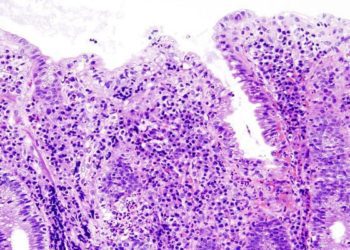Magnetic resonance enterography performs well in detecting active inflammation in pediatric inflammatory bowel disease
1. This systematic review and meta-analysis demonstrated the high diagnostic performance of magnetic resonance (MR) enterography in the diagnosis of active inflammation in pediatric inflammatory bowel disease (IBD).
2. There was substantial heterogeneity, some of which was unexplained, in the original studies which limits the reliability of this study.
Evidence Rating Level: 2 (Good)
Study Rundown: Modalities for bowel imaging in inflammatory bowel disease include small-bowel follow-through, abdominal ultrasound, CT enterography and capsule endoscopy. However, these modalities have variable sensitivities, variable ability to study the whole bowel, and radiation exposure. Magnetic resonance (MR) enterography has the advantage over other modalities as it is noninvasive, lacks ionizing radiation, and has excellent soft-tissue contrast. The diagnostic performance of MR enterography for detecting active inflammation in pediatric inflammatory bowel disease (IBD) is unclear and thus is examined in this systematic review and meta-analysis.
Eighteen original studies were analyzed which included a total of 687 patients with known or suspected IBD. The summary sensitivity was 83% and summary specificity was 93%. There was substantial heterogeneity in terms of sensitivity and specificity. Meta-analysis study of this imaging modality showed its high diagnostic performance in active inflammation in pediatric IBD. Limitations included the substantial heterogeneity of the original studies some of which was unexplained. Also 50% of the studies were retrospective, resulting in high risk of bias in patient selection.
Click to read the study, published in JAMA Pediatrics
Relevant Reading: Detection of bowel inflammation with fused DWI/T2 images versus contrast-enhanced images in pediatric MR enterography with histopathologic correlation.
In-Depth [systematic review and meta-analysis]: This systematic review and meta-analysis was conducted using a thorough search of MEDLINE and EMBASE up to January 2017 to identify studies that evaluated the diagnostic performance of MR enterography for detection of active inflammation in pediatric patients with known or suspected IBD. These studies were independently reviewed by two reviewers to assess eligibility. This study was reported in accordance with PRISMA guidelines and pooled summary estimates of sensitivity and specificity were calculated using hierarchical logistic regression modeling. Primary outcome included ability of MR enterography to detect active inflammation in the pediatric IBD population.
Eighteen studies were eligible and included 687 patients. The summary sensitivity was 83% (95%CI 75%-89%) and summary specificity was 93% (95%CI 90%-95%). The area under the summary receiver operating characteristic curve was 0.95 (95%CI 0.93-0.97) however there was substantial heterogeneity in both sensitivity (I2=84.1%) and specificity (I2= 68.8%), some of which was due to unexplained factors.
Image: PD
©2017 2 Minute Medicine, Inc. All rights reserved. No works may be reproduced without expressed written consent from 2 Minute Medicine, Inc. Inquire about licensing here. No article should be construed as medical advice and is not intended as such by the authors or by 2 Minute Medicine, Inc.





